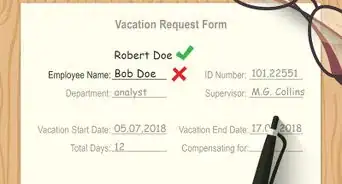wikiHow is a “wiki,” similar to Wikipedia, which means that many of our articles are co-written by multiple authors. To create this article, 32 people, some anonymous, worked to edit and improve it over time.
This article has been viewed 259,809 times.
Learn more...
A good nickname is like a calling card. It says who you are and quickly sets you apart from other people with the same name. Whether you are looking to adopt a new moniker for practical reasons or just for fun, here is how to choose a nickname based on your own name and make it stick.
Steps
Weighing the Options
-
1Look at your name. Think about shorter names that might be hidden inside it. For example, the name Steven contains the shorter name Steve. The name Alfred contains Al, Alf, Fred, and Red. Those names in turn might also have nicknames, such as Alfie (for Alf). Many people choose a nickname based on their own first name because it is easy for themselves and others to remember.
- Last names can also be a good source of nicknames. For example, people whose last names begin with Mc- or Mac-, as in John McClane, sometimes choose to go by the nickname Mac. A last name itself can also be a nickname.
- Consider letter combinations in your name that might not be regular names, but which are easy to say. Someone named Steven might think about going by Te or Ven.
- Nicknames based on your name can be spelled however you like. "Mack" works just as well as "Mac." The pronunciation is more important than the spelling.
-
2Look at your hobbies and talents. If you have a reputation for doing something well or standing out in some other way, it can lead to a nickname. Someone with a loud, booming yell might go as Boomer. A very smart person is sometimes called a "brain;" Brain can also be a great nickname. To ensure that the nickname you choose references your own name, look for nicknames that share a first letter with your name, or that rhyme with it.Advertisement
-
3Check your family heritage. The places you grew up, as well as the places your ancestors lived, can sometimes provide great nicknames. People with ancestors in the Netherlands could choose the nickname Dutch; a person who grew up in Texas might go as Tex or Texie. A strong sense of connection to an ancestral culture can also provide nicknames that mean the same thing as your name means, but in another language or cultural tradition.
Choosing the Perfect Nickname
-
1Find your favorites. Write down all the names you came up with, and then say them aloud. Introduce yourself as each one and think about how they sound to you. If you are having trouble deciding which names sound better than the rest, take some time away from the process and return to it in a day or so. The goal is to find one name you prefer above all the others, plus a couple of alternatives.
-
2Test the waters. With your preferred nicknames in mind, speak to those around you and see what they think. It can be difficult to get a nickname to stick if others do not like it. Ask friends to call you by your preferred nickname. If they seem game, the nickname is likely to stick. If they are not on board with the idea, it may be time to try one of your alternates instead.
-
3Rock your new nickname. Now that you have found a nickname your friends are willing to call you, introduce yourself to others using it. Ask teachers and new employers to call you by it. Consider going by your nickname on social networking sites such as Facebook. Your new nickname will be cemented in no time.
Community Q&A
-
QuestionWhy would we choose our own nickname?
 Community AnswerSome people just don't like their full name, or would like to have a shorter/cuter version of their name for people to call them.
Community AnswerSome people just don't like their full name, or would like to have a shorter/cuter version of their name for people to call them. -
QuestionWhat is a good nickname for Susanna?
 Community AnswerSusie? Susan? Anna? It depends on your personality. If you're girly, Susie is a good choice. If you're a tomboy, try Susan, or even Suze.
Community AnswerSusie? Susan? Anna? It depends on your personality. If you're girly, Susie is a good choice. If you're a tomboy, try Susan, or even Suze. -
QuestionWhat would be some good nicknames for the name "Jaiden"?
 Community AnswerA common nickname for the name Jaiden is Jai/Jay, however you want to spell it.
Community AnswerA common nickname for the name Jaiden is Jai/Jay, however you want to spell it.
Warnings
- Overly grandiose nicknames (like "Dragon") rarely stick, because people feel silly calling others by such names. On the other hand, a name that is too ridiculous (like "Turd Monster") may backfire and stick a little too well, leading to ridicule. Stick to names that slide by in conversation without too many raised eyebrows.⧼thumbs_response⧽
- If your friends already have a nickname for you, it may be very difficult to change it. If it is a mean or hurtful nickname, speak to them about how it makes you feel first, instead of just trying to overlay it with a new one.⧼thumbs_response⧽
About This Article
If you’re not a huge fan of your name or you want a shorter version, try choosing your own nickname. Consider basing it off your first name. For example, if your name’s Alfred, you could have the nicknames Al, Alf, Fred, Red, or Alfie. You can also base it off your surname. For instance, if you have the surname McClane, you can go by Mac. If people know you for a certain hobby or talent you have, consider using this instead. For example, if you’re the only left-footed soccer player on your team, you can ask people to call you Lefty. Alternatively, base it on where you grew up, like “Tex” if you’re from Texas. If you have a few ideas you’re considering, ask your friends and family what they think suits you best. For more tips, including how to get your new nickname to stick, read on!
































































